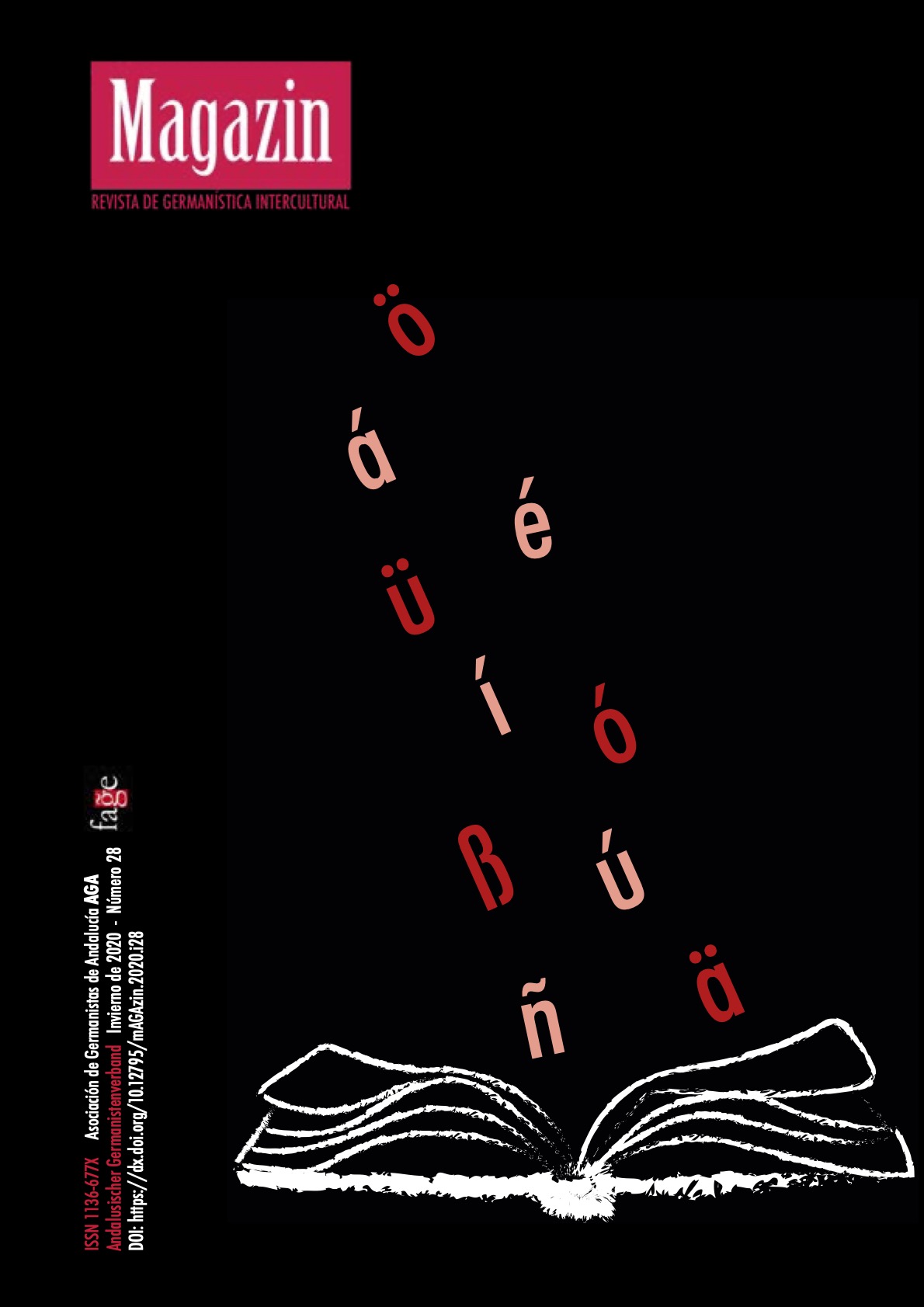Embodied learning of the German language: teaching methodology for translators and interpreters
DOI:
https://doi.org/10.12795/mAGAzin.2020.i28.05Keywords:
German language didactics, Translation and Interpretation Studies, embodied learning, skills developmentAbstract
Experimental Cognitive Sciences show important
progress in terms of the functioning of the knowledge
acquisition and memory mechanisms. These advances
must be considered in the Translation and Interpreting
career, since the profession of translator or interpreter
not only requires good linguistic fluency, but also highly
developed specific cognitive skills. Thus, numerous
neuro and psycholinguistic studies show that the skills
of working memory and interlinguistic executive control,
so essential for the work of translation/interpretation
that includes balancing between two languages, are
susceptible to their training through early practices.
Likewise, there are significant advances in knowledge
about other skills necessary for this task, such as
conceptual fluency, metaphorical competence or the
practice of public speaking, among others. The present
work describes the German teaching experience for
future translators or interpreters that integrates the
last experimental Cognitive Sciences advances. The
present study is about the translation skills training
from the initial phase of learning German, which turns
Translation and Interpretation studies into an empirical
and embodied experience that is motivating for both
students and teachers.
Downloads
References
Al-Hoorie, A.H., Hiver, Ph., Tae-Young, K., De Costa, P.I. (2021): “The identity crisis in language motivation research”. Journal of Language and Social Psychology. October 19. DOI: 10.1177%2F0261927X20964507
Bajo, M.T., Padilla, F., Padilla, P. (2000): “Comprehension processes in simultaneous interpreting”. Translation in Context. DOI: 10.1075/btl.39.15baj
Barsalou, L.W. (2016): “Grounded cognition: past, present, and future”. Topics in Cognitive Science 2, 716-724.
Barsalou, L. W. (2016): “Situated conceptualization: Theory and applications”. Y. Coello & M. H. Fischer (Eds.), Foundations of embodied cognition: Perceptual and emotional embodiment. Routledge/Taylor & Francis Group, 11–37.
Birulés, J., Lewkowicz, D., Pons, F. & Bosch, L. (2019): “The role of language proficiency in visual attention to a talking face:
Evidence from both Looking Times to pre-defined AOIs and
Hidden Markov Model (HMM) analysis”. XIV International Symposium of Psycholinguistics, Tarragona, 2019.
Casado, A., Palma, A., & Paolieri, D. (2017): “The Influence of Sex Information on Gender Word Processing”. J Psycholinguist Res, Springer. https://doi.org/10.1007/s10936-017-9546-3.
Casasanto, D. (2017): “Relationship between Language and Cognition”. En B. Dancygier (ed.), Cambridge Handbook of Cognitive Linguistics, Cambridge: Cambridge University Press, 19-37.
Danesi, M. (2017): Conceptual Fluency Theory and the Teaching of Foreign Languages. Ph.D. Nova.
Danesi, M. (1995): “Learning and teaching languages: the role of “conceptual fluency”. International Journal of Applied Linguistics, vol. 5, Nr. 1, 3-20.
Evans, V. & Green, M.C. (2006): Cognitive Linguistics: An Introduction. Edinburgh: Edinburgh University Press.
Faber, P., Montero Martínez, S., Castro Prieto, M.R., Senso Ruiz, J., Prieto Velasco, J.A., León Araúz, P., Márquez Linares, C.F. & Vega Expósito, M. (2006): “Process-oriented terminology management in the domain of Coastal Engineering”. Terminology 12 (2), 189-213.
Faber, P., Verdejo-Román, J., León-Araúz, P., Reimerink, A & Guzmán Pérez-Carrillo, G. (2017): “Specialized knowledge processing in the brain: an fMRI study”. En P. Faini (ed.) Terminological Approaches in the European Context, Newcastle-upon-Tyne: Cambridge Scholars Publishing, 168-182.
González-Nosti, M., Barbón, A., Rodríguez-Ferreiro, J. & Cuetos, F. (2014): “Effects of the psycholinguistic variables on the lexical decision task in Spanish: A study with 2,765 words”. Behaviour Research 46, 517-525. doi: 10.3758/s13428-013-0383-5.
Ibáñez, A.J., Macizo, P., M.T. Bajo (2010): “Language Access and language selection in professional translators”. Acta Psychologica 135, 257-266. https://doi.org/10.1016/j.actpsy.2010.07.009
Kiefer, M. & Barsalou, L.W. (2013): „Grounding the human conceptual system in perception, action, and internal states”. En W. Prinz, M. Beisert, & A. Herwig (eds.) Action Science: Foundations of an Emerging Discipline, 381-407. MIT Press: Cambridge, MA.
Koreneva, Olga (2017): La conceptualización en la terminología medioambiental ruso-española: estudio terminológico y psicolingüístico experimental. Tesis doctoral. Universidad de Granada.
Lebois, L., Wilson-Mendenhall, C.D., Simmons, W. K., Feldman Barrett, L., Barsalou, L.W. (2020): “Learning situated emotions”. Neuropsychologia, aug. 20. DOI: 10.1016/j.neuropsychologia.2018.01.008
Macizo, P. & Bajo, M.T. (2006): “Reading for repetition and Reading for translation: do they involve the same processes?” Cognition 99 -I, pp. 1-34. doi.org/10.1016/j.cognition.2004.09.012
Merleau-Ponty, M. (1962): The phenomenology of perception. (C. Smith, Trans.). London and New York: Routledge, (Original work published 1945).
Morales, J., Padilla, F., Gómez-Ariza, C.J., Bajo, M.T. (2015): “Simultaneous interpretation selectively influences working memory and attentional networks”. Acta Psychol (Amst.) 2015, Feb.155, 82-91. doi: 10.1016/j.actpsy.2014.12.004
Padilla Adamúz, F.M. (2002): Memoria de trabajo y funciones de control en la interpretación de lenguas. Tesis doctoral. Universidad de Granada (2002).
Paolieri, D., Padilla, F., Koreneva, O., Morales, L. & Macizo, P. (2019): “Gender congruency effect in second language production: Evidence from Russian-Spanish bilinguals”. Bilingualism: Language and Cognition, 22, 112-129. doi: 10.1017/S1366728917000591.
Stolz, Steven A. (2015): “Embodied Learning, Educational Philosophy and Theory:
Incorporating ACCESS”, Educational Philosophy and Theory 47(5), 474-487, DOI: 10.1080/00131857.2013.879694
Suarez-Coalla, P., Garcia-de-Castro, M. & Cuetos, F. (2013): “Predictors of reading and writing in Spanish”. Infancia y Aprendizaje 36 (1), 77-89.
Yudes, C., Macizo, P., Morales, L., Bajo, M. T. (2011): “Comprehension and error monitoring in simultaneous interpreters”. Applied Psycholinguistics 34, 1039-1057. DOI: 10.1017/S0142716412000112
Radio Wunderbar. RadiOlavide, Universidad Pablo de Olavide. https://radiolavide.org/programa/radio-wunderbar
Proyecto YourTerm Medical. Parlamento Europeo. Dirección General de la Traducción. Coordinación terminológica.
Podcast de la Coordinación Terminológica del Parlamento Europeo, IATE GOES AUDIO. https://termcoord.eu/iate-goes-audio/
Event Translation Studies, Coordinación Terminológica del Parlamento Europeo. https://termcoord.eu/2020/10/interviews-with-pablo-de-olavide-university-event-study/
Why is Terminology your passion, Coordinación Terminológica del Parlamento Europeo. https://termcoord.eu/termania/why-is-terminology-your-passion/
Published
How to Cite
Issue
Section
License
Self-archiving policy
Romeo Blue Journal (applied)
Only editor PDF can be archived
Author cannot archive the pre-print version
Author cannot archive the postprint version




